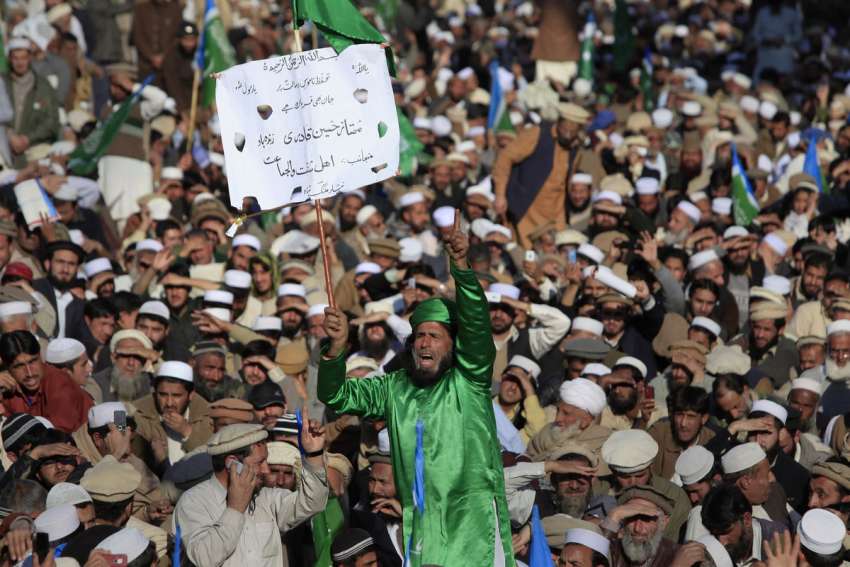And in Canada, the story of a newly arrived Christian refugee woman — who narrowly escaped being burned alive in Pakistan two years ago on trumped-up blasphemy charges — underscores the irony of Pakistan leading the charge to punish Sweden and Denmark.
In Baghdad, Iraq’s capital, mobs stormed the Swedish embassy and set fires within its compound, causing Swedish Prime Minister Ulf Kristersson to announce on social media that his country is in the most serious security situation since the Second World War and put Sweden’s security agencies on high alert for possible terrorist attacks.
Danish politicians hastened to explore legal means of stopping protests that included the burning of religious texts.
In Pakistan, the same Koran-burning incidents in Europe sparked nation-wide protests, with the largest rallies in Karachi and Lahore, prompting the country’s Catholic leaders to raise concerns for their safety after receiving threats from the Lashkar-e-Jhangvi, a terrorist group that operates in Pakistan and Afghanistan.
The official response from Pakistan mirrored the fury of the mobs that set fire to the Swedish embassy compound and the office of the NGO the Refugee Council in Baghdad.
Pakistan introduced a motion on behalf of the 57-member Organization of Islamic Cooperation at the UN Human Rights Council calling for the UN to publish a report on religious hatred and for states to review laws that impede the prevention and prosecution of acts of religious hatred. Despite opposition by the United States, the European Union and several Western countries on the grounds that it challenged established freedom of speech and expression principles, the motion passed, with 28 voting in its favour.
For Tabeeta Nazir Gill, a Christian woman who recently arrived in Canada as a refugee from Pakistan, the fury that erupted in the Islamic world, and the drama at the UN Human Rights Council, evoke memories of her own ordeal in her native country. The story began in January 2021 and could have ended in tragedy “but for the grace of God,” as she says.
Gill’s experience is a variation of a constantly recurring theme in the history of Pakistan’s relentless persecution of religious minorities — the country’s notorious blasphemy laws being used to pursue a vendetta against personal enemies.
“A mob wanted to kill me but I kept praying to Jesus. I opened my eyes and I felt I saw angels, and from that moment I knew that I would be saved,” Gill told The Catholic Register.
“Tabeeta, who was working as the head nurse in a Karachi hospital for poor people, found out that a Muslim colleague was taking money from patients, which was against the rules,” explained Peter Bhatti, president of the Toronto-based International Christian Voice (ICV), which was instrumental in bringing Gill to Canada under the private sponsorship program.
“Tabeeta asked her to stop accepting money from patients, but a group of colleagues ganged up on the head nurse, screaming that she had committed blasphemy, assaulted her and locked her in a room until the police arrived and arrested her. The news spread on social media that she had insulted Islam. Soon a mob of hundreds surrounded the police station, threatening to burn her alive.”
The police, however, believed Gill’s story and set her free, but she was forced to leave the city and go into hiding. She and her family then escaped to Dubai, where Bhatti and his activist colleagues in Canada made contact with her.
The story ended happily for Gill when she arrived in Canada on June 19 and was welcomed by members of the Pakistani Canadian Christian community, many of whom had fled Pakistan for similar reasons.
“I am so thankful to God, to ICV and to all the Christian pastors and others who supported me while I was in Dubai,” she said. “Here in Canada, I can breathe freely, and I no longer feel threatened or suffocated.”
Gill’s story is a familiar one to Raheel Raza, a Pakistani Canadian Muslim journalist, human rights activist and outspoken opponent of Islamic extremism.
The irony of Pakistan leading the charge against Sweden and Denmark over the Koran burning issue is not lost on Raza.
In an article in January, the New York Times reported that Pakistan had passed new legislation to ensure its the judicial system handed out even harsher punishments than before to those accused under the blasphemy laws; also, that the accused are often subjected to mob violence long before any charges are formally laid.
“Pakistan should be the last country in the world to pontificate on tolerance,” said Raza. “Fact is that Pakistan is a country with an abysmal religious freedom record. It’s ridiculous beyond belief if Pakistan takes a lead in charges against Sweden and Denmark. Pakistan has relentlessly persecuted even Muslims like Ahmaddiyas and Shias (Muslim sects considered heretics by the Sunni majority), so we can well imagine how unsafe Hindus and Christians feel.”
Raza pointed out, however, that Muslims have a right to protest Koran burnings, provided the protests are peaceful.
“Sweden’s laws allow freedom of expression,” she said. “It may be morally and ethically wrong, but it’s not a crime to commit such an act. An outcry by Muslims is justified, provided the outcry itself does not become violent.”

